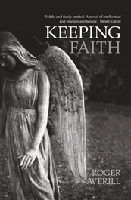 | Roger Averill Keeping Faith Transit Lounge Publishing, 231 pp. Source: review copy Review by Michael Freedman |
Given its subject matter, Keeping Faith could have been, very easily, a very preachy novel. As it is, it wobbles its way over the increasingly narrow line between piety and nihilism like a drunk motorist attempting to pass a roadside breath test. For the most part, though, the author's efforts not to take sides in the debate make for an entertaining read, although some readers may be frustrated by his clear decision to remain completely objective. This is fiction, after all, not a history textbook.
In this reviewer's opinion, however, Averill has done extremely well with some difficult subject matter, particularly for a debut novel. Author of the acclaimed Boy He Cry: An Island Odyssey, an account of his 12 months on a remote island in Papua New Guinea, Averill brings much of his experience of poverty, religion, racism, and isolation to the character of Gracie, a missionary who battles most of the hardships Averill himself experienced in an attempt to bring religion to the Papuan locals. In doing so, Averill weaves into his story elements of hopelessness and despair, and does not pull punches in establishing the ever-present threat of violence in such a lifestyle.
There are two main characters in Keeping Faith - Gracie's brother Josh, who represents the agnostic aspect of the story, and Gracie herself, who epitomises the devoutly religious perspective. To those two could perhaps be added a third - Josh and Gracie's father, a laypreacher, who shapes the character of the young protagonists, but who by the end of the novel has lost touch with both of them. The novel is constructed around the central question of how they got to that point, and it is this that keeps the reader's interest.
Some interesting themes infuse the novel. Josh, as an adult, works as a nurse on a maternity ward, and was once churchgoing but has since lost his faith. It is not a coincidence that Josh, the skeptic, spends his adult life in a occupation in which the participants trust not to religion but to science, and are assimilated into a often bleak existence of observing both the start of life, and the end of it. But it is Gracie the missionary, who is extremely pious almost to the degree of being one-dimensional, who suffers extreme tragedy and heartbreak at the hands of the very people she has come to "save". And it is the father, the laypreacher, who is unable to directly comfort either of his adult children, who nevertheless provides the substance on which the family depends.
Above all, the novel is about a loss of innocence, of the security of childhood, and of faith. At times it rambles. And because the story is told from three different viewpoints, two of which are from the same character, it can often be a little confusing. But it is not disappointing, because it never shies away from its ultimate goal to tell a story, not to preach, but to show that in life, there are often no right answers. The novel seems to end at an almost random point, but perhaps in the end that actually is the point. Just like there are no right answers, there are often no happy, uplifting endings either. Sounds bleak, but at least it is real.
